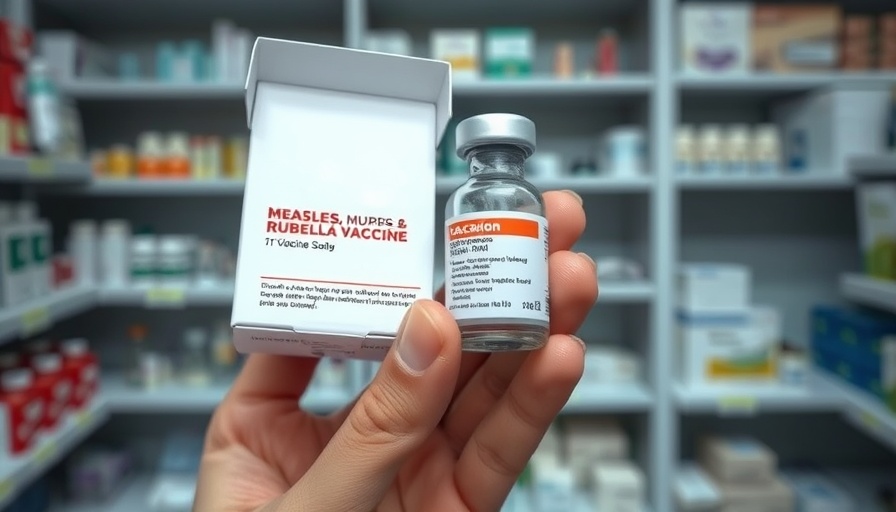
US Childhood Vaccination Rates Continue to Decline: What You Need to Know
In alarming news for public health, recent federal data indicates that U.S. kindergarten vaccination rates have fallen yet again, coinciding with a record high in vaccine exemptions. The exemption rate among children has risen to 4.1%, an increase from 3.7% across the last year. This trend marks the third consecutive year of record-breaking exemption rates, largely attributed to parents opting out of vaccinations for non-medical reasons.
Vaccination is crucial for collective immunity, and the current statistics raise serious concerns. Only 92.5% of kindergartners received their mandatory measles-mumps-rubella (MMR) vaccinations for the 2024-25 school year, a dip from the pre-pandemic level of 95%. According to experts, this dip is particularly worrisome in the context of the ongoing measles outbreak, which has hit its most significant level in over three decades. More than 1,300 cases of measles have been reported thus far, prompting urgent discussions about the implications of declining vaccination rates.
The Consequences of Falling Vaccination Rates in Communities
The implications of these declining vaccination rates are serious for local communities. Public health officials warn that as more children remain unvaccinated, the likelihood of disease outbreaks increases. Dr. Sean O'Leary from the American Academy of Pediatrics has expressed concerns that if vaccination coverage continues to decrease, communities could witness a surge in measles cases.
Texas, for instance, has been one of the hardest-hit states, accounting for over half the nation’s reported measles cases. Recently, Texas lawmakers made it easier for parents to obtain exemptions from vaccine requirements, thus potentially exacerbating the public health crisis. The juxtaposition of increasing disease cases and lax exemption laws paints a troubling picture for families and health authorities alike.
Shifts in Public Health Messaging and Their Impact
The Centers for Disease Control and Prevention (CDC), which historically emphasized vaccination safety and collective responsibility, appears to be changing its messaging. Recent statements from the CDC have focused on vaccination as a personal choice. This shift has drawn criticism from public health officials who argue that such messaging could undermine the urgency of vaccinations. The choice to vaccinate shouldn't solely focus on individual preference but rather on communal health and safety.
According to O'Leary, the potential weaknesses in the CDC's communications could significantly affect public perception of vaccinations and could lead parents to further hesitate about vaccinating their children. It’s essential to ensure that vaccination messaging remains proactive and clear to combat the prevailing myths and misinformation surrounding vaccine safety.
Addressing the Myths: Necessary Conversations on Vaccine Safety
A robust dialogue around vaccines is necessary to address the misunderstandings surrounding their necessity and safety. Common myths that suggest vaccinations pose greater risks than contracting a disease must be dispelled through education and open conversations. Schools, healthcare providers, and community organizations can play a pivotal role in communicating accurate information about the benefits of vaccines.
For example, numerous studies have shown that vaccines not only prevent the immediate dangers associated with diseases such as measles and whooping cough but also contribute to long-term health benefits, potentially reducing healthcare costs associated with severe illness. Parents are urged to have open dialogues with their healthcare providers and to seek credible sources of information regarding immunizations.
Looking Ahead: The Importance of Vaccine Advocacy
To secure the health of future generations, community advocacy for vaccination is paramount. Engaging parents through informational sessions, storytelling from those affected by preventable diseases, and sharing evidence-based research can positively influence perceptions and decisions regarding vaccines. Community events can serve as platforms for education while emphasizing the critical nature of vaccinations in achieving herd immunity.
As we confront these challenges, we must remind ourselves that the decisions we make today about vaccination can profoundly affect public health tomorrow. Conversations surrounding vaccine advocacy need to be seen not just as a personal matter but as a community responsibility.
Taking Action: How You Can Help
Parents, community members, and local leaders can play significant roles in influencing vaccination rates in their areas. Attending local health events, advocating for vaccine safety, and leading discussions with trusted health professionals can help shift perceptions and combat misinformation. It's crucial for us all to band together, emphasizing the collective importance of protecting our children and, by extension, our communities.
The fight against preventable diseases begins with informed choices. Discuss the significance of vaccinations with your friends and family and encourage them to consult healthcare providers if they have concerns. Together, we can forge a healthier future for our children.
 Add Row
Add Row  Add
Add 




Write A Comment